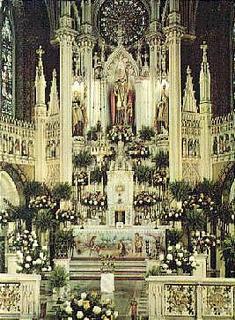
I have come across an incredible website on Eastern Christianity. In a paper published in the Encyclopedia of Monasticism, the author describes perfectly the cornerstone of Christian Mysticism--the dichotomy between the inner "poverty" of spirit of the individual Christian and the outward opulence of the liturgy.
Perhaps no polarity in Eastern Christian spirituality is more striking and more apparently contradictory than that of the hermit's stark poverty and simplicity, on the one hand, and, on the other hand, the gorgeous splendor of the late Byzantine liturgy, dripping gold and conducted in the presence of mosaics and murals fabricated with all the expense and subtlety available to a millenial civilization. Yet, neither the hermit nor the episcopal celebrant would at all accept this as a paradox, let alone a contradiction. The former would -- and does -- understand the magnificence of the earthly church's liturgy as a mirror, both of the angels' worship in the heavenly temple before the throne of God, and of the divine presence within the purified heart.The bishop and, perhaps even more so, the devout laity see in their turn the Kingdom of God reflected equally in the glory of the Church's common worship...bright and fragrant already with presence of the world to come.
That, my friends, is the purpose of a liturgical spirituality--to transport us to God. To bring God, in a sense, to us.
The picture above is of the high altar in Saint Alphonsus Church in Baltimore, MD, USA. It gives you a little taste of what liturgy is meant to do. I think we sadly shortchange the glory of God when we turn our altars into kitchen tables and our hymns into praises of ourselves. At least during the season of Easter, we should strive to illustrate the incomprehensible beauty of the Divine Presence.


4 comments:
I very much agree with the Eastern approach to liturgy. It seems to me one of the main purposes of liturgy is to inspire awe in the congregation, and to remind us that we are in the presence of God. Since the eucharist is the place where the terrestial meets the celestial, we should try as hard as possible to remind ourselves of the celestial.
Well put, Daniel!
As an Eastern Orthodox Christian, I have recently visited several local Catholic churches for mass as I have several Catholic friends. On Assumption, I went to a Latin High Mass. I must say, that mass was lacking nothing in majesty. As I kidded my friend upon our leaving, "now why did you go and change that after Vatican II again??" :)
"now why did you go and change that after Vatican II again??"
Many of us are still shaking our heads, asking ourselves the same question!
Post a Comment